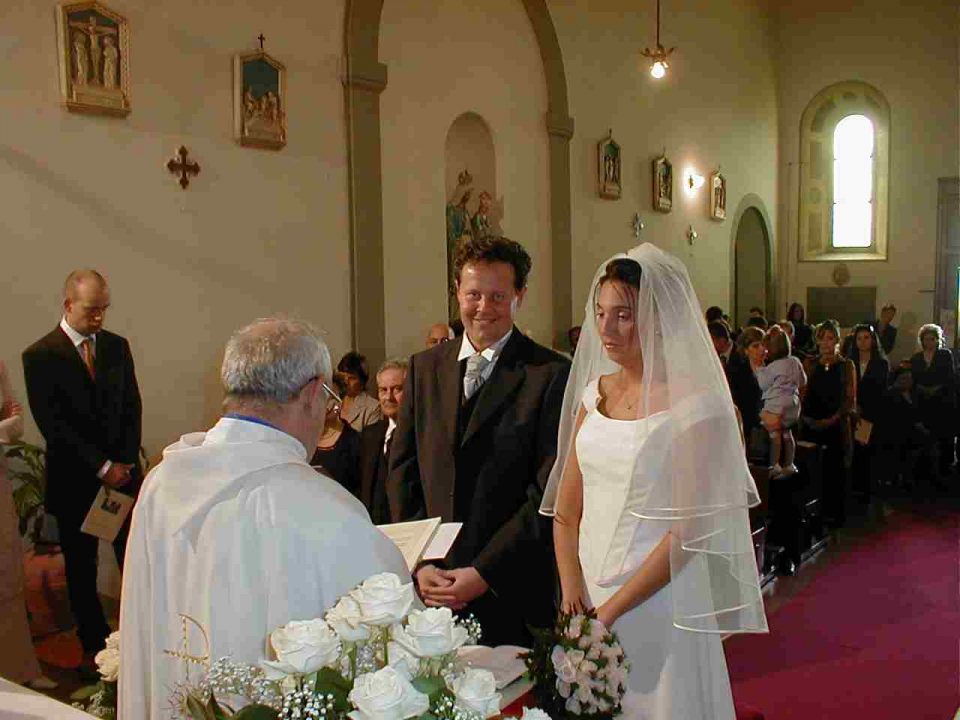Difference between sacramental marriage and civil ceremony

Marriage is generally defined as marriage or the state of being married, and sometimes as the marriage ceremony. The word first appeared in Middle English in the XNUMXth century. Enter in English through the ancient French word matrimoignie, which derives from the Latin matrimonium. The root matr- derives from the Latin mater, for "mother"; the suffix - mony refers to a state of being, a function or a role. Therefore, marriage is literally the state that makes a woman a mother. The term highlights to what extent the reproduction and care of children are fundamental to marriage itself.
As the Code of Canon Law observes (Canon 1055), “The marriage covenant, with which a man and a woman establish a relationship of life throughout them, is by its nature ordered towards the good of the spouses and procreation and education offspring ".
The difference between marriage and marriage
Technically, marriage is not simply synonymous with marriage. As p. In his modern Catholic dictionary, John Hardon notes that marriage "refers more to the relationship between husband and wife than to the ceremony or state of marriage." That is why, strictly speaking, the sacrament of matrimony is the sacrament of matrimony. During the Catechism of the Catholic Church, the Sacrament of Marriage is referred to as the Sacrament of Marriage.
The term marriage consent is often used to describe the free will of a man and woman to enter into marriage. This underlines the legal, contractual or covenant aspect of marriage, which is why, in addition to being used to indicate the sacrament of marriage, the term marriage is still widely used today in legal references to marriage.
What are the effects of marriage?
Like all sacraments, marriage provides specific sacramental grace to those who take part in it. Baltimore's venerable catechism describes the effects of marriage, which that sacramental grace helps us achieve, in question 285, which is found in Lesson XNUMX of the First Edition of Communion and Lesson XNUMX of Confirmation:
The effects of the sacrament of marriage are: 1 °, to sanctify the love of husband and wife; 2d, to give them the grace to bear mutual weaknesses; 3d, to allow them to raise their children in fear and love of God.
Is there a difference between civil marriage and holy marriage?
At the beginning of the 21st century, while legal efforts to redefine marriage to include same-sex union unions increased in Europe and the United States, some attempted to distinguish between what they call civil marriage and holy marriage. In this perspective, the Church can determine what constitutes a sacramental marriage, but the state can define a non-sacramental marriage.
This distinction is based on a misunderstanding of the Church's use of the term holy marriage. The adjective saint simply refers to the fact that a marriage between two baptized Christians is a sacrament - as the Code of Canon Law states, "a valid marriage contract cannot exist between the baptized without this being a sacrament". The basic condition of marriage is no different between marriage and holy marriage because the fact of the marriage union between man and woman precedes the legal definitions of marriage.
The state can recognize the reality of marriage and enact laws that encourage couples to enter into marriage and grant them privileges for doing so, but the state cannot arbitrarily redefine marriage. As the Baltimore catechism states (in question 287 of the confirmation catechism), "The Church alone has the right to enact laws on the sacrament of marriage, although the state also has the right to enact laws on the civil effects of the marriage contract".